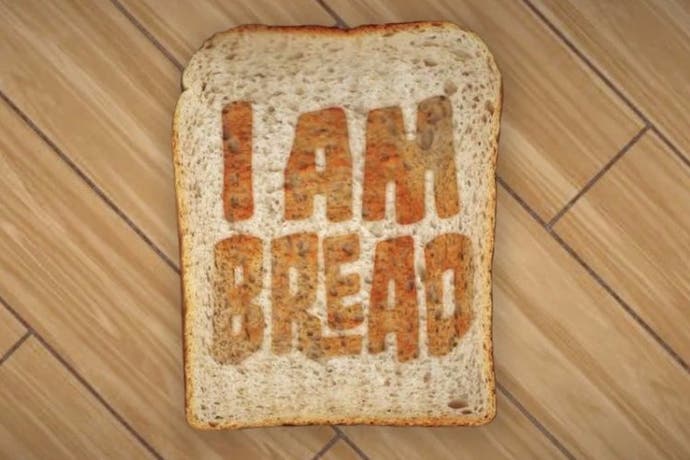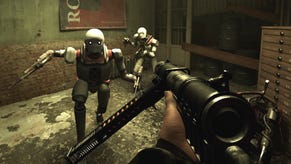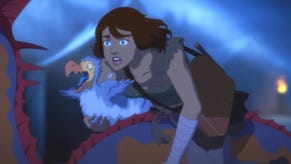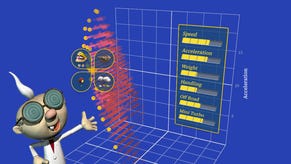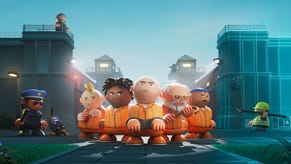Shaking off accusations of YouTube bait
After Surgeon Simulator and I Am Bread, Bossa spreads its wings.
In April 2013 superstar YouTuber PewDiePie played Surgeon Simulator, a game about clumsily performing operations, and made a video about it. It's had 11.5m views.
PewDiePie wasn't the only YouTuber to make videos about Surgeon Simulator, but he was certainly the biggest. Surgeon Simulator's unique gameplay mechanic, which revolves around controlling a hand and its fingers and, more often than not, butchering your victim - sorry, patient - is Let's Play gold. Such randomness. Much laughs.
Surgeon Simulator was a breakout hit for its developer, London-based Bossa Studios, and the YouTubers who played it. Last month the game hit the two million sales mark - not bad for a side project birthed by a two-day game jam.
It also established a new type of game genre. "We made a VR game before VR was a thing," designer Luke Williams says. "And so now we've secured that genre. If you control your hand directly, it's a Surgeon Simulator-inspired game."
Or, for some, it's a "YouTube bait" game.
You know the kind: half-finished games with some wacky physics-based mechanic and tonnes of bugs. Developers will make an unplayable mess but, wait! Haha! See! It's deliberately shit! But that's fine because raging at it is funny! It's all a bit cynical.
Coffee Stain Studios' Goat Simulator is often mentioned as a classic example of YouTube bait. Here is a game rooted in the random and the wacky. It's a comedy game, essentially, in which crazy things happen that make you laugh. In March 2014 PewDiePie made a Goat Simulator video and it's had 11.4m views.
Surgeon Simulator wasn't designed as YouTube bait, but it perhaps sparked the trend. Bossa's follow-up I Am Bread, though, well, you start to wonder.
I Am Bread sees the player control a slice of bread. It's fiddly, as Surgeon Simulator is, because you're controlling the four corners of the bread, and they each seem to have a life of their own. Your goal is to become toast, in whatever hilariously cumbersome way you can think of.
When I Am Bread came out in late 2014 it felt like all the video game YouTubers were ready to pounce. PewDiePie's first I Am Bread video has four million views. Was it YouTube bait?
Williams says no, as you'd expect. There's a difference, he suggests, between games that make for good YouTube videos because they're just crap, and games that make for good YouTube videos because they're designed in such a way to make each playthrough different. People buy the latter kind of game, Williams said. They do not buy the former.
"With Surgeon and I Am Bread, when people see it in motion, because it's unusual and it's intriguing and you see all these YouTubers playing it slightly differently or different stuff is happening because of the nature of the controls and physics, that translates into a lot of people going, I'm going to buy it," he says.
"Whereas if you watch this giant mess and, yes, it's funny because a YouTuber is raging or having a bad time, after that you don't go, 'oh I want to play that as well.' You just think, 'this is a throwaway video. I laughed at some point.'
"At the end of the day your game has to be good. You can't go, 'I'm going to make this game for YouTube.' You have to be like,' how am I going to make a good, interesting and unique game?' YouTubers naturally pick those things up and play those games."
Like Surgeon Simulator, I Am Bread emerged from a Bossa game jam. Williams liked the idea of a bread that would want to become toast, because it meant it could be placed within any environment and would present a unique challenge to the player. Most players begin by thinking, 'well, if I can just find a heat source...' Then the physics come into play.
"It felt elegant, just a hole in one," Williams says. "You're bread. Become toast. And then it's how you influence the environment and change that. It's so simple to understand. It's the same thing with Surgeon. Perform a heart transplant. Go. That's what I'm attached to. It did happen to be a little bit wacky. But that wasn't like, 'aha, yeah, we'll make it so random.' It's just everything fit together in a theme. This bread just needs to become toast."
When it comes to YouTube bait games, or games labelled - rightly or wrongly - as YouTube bait, it seems the controls are key. If a game is frustrating and fiddly, and the player often fails, it qualifies. But Williams challenges the suggestion Bossa's games fall into this trap. "You can get good at these controls," he insists.
"They're not deliberately hard. With Surgeon, we had a hand and we wanted you to control each finger, but also you need to move around, so we had to have the mouse for that, and then the keyboard for the fingers. We tried to make that the best control we could for controlling a hand. It wasn't like, 'we want to control a hand, let's make it as hard as possible.' It was, 'we want you to directly manipulate and control a hand. How well can we do that?'
"The same thing with Bread. If it's a flat bread, yeah, we could have done a control stick to move it around and press A to jump. That's not interesting. You've just replaced a character with a slice of bread. But if it's actually bread, how would it move? It would flop around. It would be all ploppy. We tried loads of stuff. We were trying to figure out the best way to move a piece of bread around in a way you would think a piece of bread would move.
"They're difficult but only because it's a completely new way of having to control something. But that's interesting to me. People get good at it. That's the key. As you play it you go, 'oh, I'm actually getting better. Next time I'm going to get further because I'm getting better at the game.' It's a natural skill progression."
Bossa has, Williams points out, made I Am Bread easier as it's gone through the Steam Early Access process, but still challenging.
"It's just a type of game I like to make," he adds. "I like creating these strange, challenging controls, but something I want to get my skill up. One example I go to is Mirror's Edge. All the abilities are there from the start. You don't get to level three and then, you can now wall jump! What's interesting to me is when you've got everything your character can do from the beginning, and we throw these new challenges at you and you have to react."
There's evidence to suggest Williams is right about I Am Bread and its control scheme. The overhang is an advanced technique where the player swings with the bread and as it hits a corner, lets go so the bread flops around, letting you grip onto something else. This, Williams says, is not some weird skill move you unlock, rather a way of moving fuelled by the physics. People speedrun this game.
And yet, I Am Bread has been labelled YouTube bait by many and it's a tough label to shake off. "People will always jump to that and that's fine," Williams counters. "We are prominent in YouTube. But as long we have the conviction of, 'we're still trying to make a good game here'... the games people think are good just naturally rise to YouTube regardless of the genre or type of game they are."
From Bossa's perspective YouTube isn't some marketing opportunity it can throw money at. And YouTubers know their audiences can smell a paid for Let's Play a mile away. The relationship is mutually beneficial, but not artificial.
"If YouTubers aren't playing our game then clearly it's just not good enough, or it's not appealing to them," Williams says. "We wouldn't pay YouTubers to play our games. If they're not willing to have fun with a game, who else would?"
Bossa's next game, Worlds Adrift, continues the developer's focus on physics-based gameplay, but it's more ambitious than Surgeon Simulator and I Am Bread. Imagine Minecraft with flying ships, multiplayer adventuring and a Dark Souls-style respawn system. As Williams explains: when a player gets hit by a cannonball he isn't killed because cannonballs do X amount of damage to players, but because a cannonball weighs 20kgs and hit the player at 30 m/s. There's not a soggy bread or a drunken surgeon in sight.
And so, it seems unlikely Worlds Adrift will be considered YouTube bait. That's not to say video game YouTubers will pass it by, but I don't think they'll be waiting to pounce on it as they were with I Am Bread. Bossa, it seems, has had its fun and is moving on to bigger and better - perhaps more meaningful - things.
"It will probably be different because it's a much bigger, slower-paced game," Williams says. "It's not jump in and do stuff. It does tie slightly into the survival genre. We want people to swing around and take risks, and probably knock themselves out or kill themselves.
"But it's not like we're making this purely because we want to get YouTube views. We're making this because it's fucking awesome. It's still all physics. It still has those skill-based systems. That's why we don't have levelling up in the game or new skills you unlock. It's about, how good are you at the tasks?"
Will PewDiePie cover Worlds Adrift? "We'll have to see."
